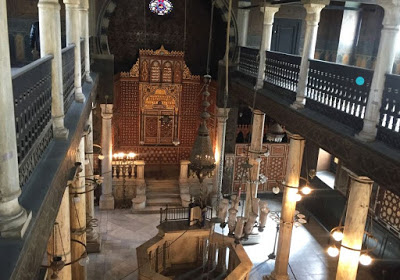
The Jerusalem Post reporter Seth Frantzman visits the Ben Ezra synagogue in Cairo, where the famous medieval Geniza found in the attic testifies to the ‘positive relationship between Jews and Muslims’. Under Gamal Abdel Nasser, however, Jews were viewed as outsiders and potential traitors.
The Ben Ezra synagogue: on the tourist trail (photo: Seth J. Frantzman)
A sign from US AID and the Supreme Council of Antiquities adorns a gate and tourists as well as Egyptian students make up the visitors to the old synagogue. A sign on the door says “Property of the Jewish community Cairo.” Around the back, but closed to the public, is a library and an unexcavated mikveh. On the second floor a small door that can only be accessed with a ladder leads to a geniza, or storage room, for sacred documents. It was here that the life story of Maimonides has come to life.
“There isn’t a home of an observant Jew in the world that doesn’t have the books of Maimonides and to be in the place where they were edited and where the texts were discovered is a great vibe, it’s powerful,” says Yitzhak Sokoloff, founder and president of Keshet Educational Journeys and a fellow at the Rennert Center for Jewish Studies at Bar-Ilan University.
On a recent trip to Egypt with Sokoloff and a tour group organized by Dr. Eric Mandel of the Middle East Political and Information Network, we saw up close the Ben Ezra Synagogue where the letters of Maimonides sat in a geniza for almost 700 years. In 1896 Cambridge University academic Solomon Schechter led an expedition to archive the Cairo geniza.
Today some 200,000 documents removed from the synagogue have been catalogued and studied, shedding light on Jewish life through the ages in Egypt and beyond.
Sokoloff says the Maimonides letters illustrate the positive relationship between Jews and Muslims in Egypt in the period. “The geniza opened up a whole world on what Jewish life was like…without that we would only have the products of his intellectual capacity and that is invaluable and moving.”
It shows how Jews traveled throughout the Mediterranean and Muslim world, sometimes as merchants, like Maimonides’s brother.
Even though the Egyptian Jewish community may be fading away, Sokoloff is inspired by the way the government has sought to make Ben Ezra part of the tourist map: “To see Muslim kids coming on a school trip and learning about Maimonides as part of their tradition and heritage, it is something they could have blotted out, but it is something they embrace, the whole experience of Jewish life in Cairo.”
For decades under Egyptian president Gamal Abdel Nasser Jews were viewed as outsiders and potential traitors in Egypt, accused of working for Israel and being part of Zionist plots. Those who remained were imprisoned and suffered other slights. Like Christians and Muslims, they had their Jewish religion stamped on their identification cards, but unlike the others they were often portrayed as a nation apart.

Leave a Reply